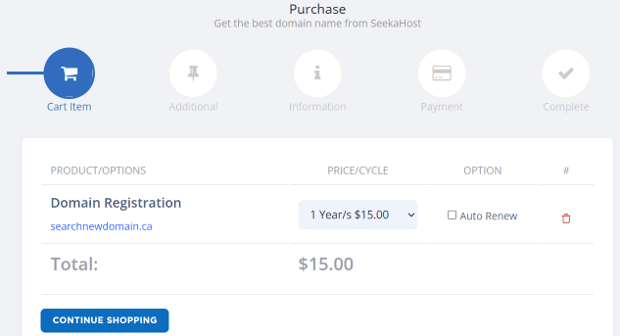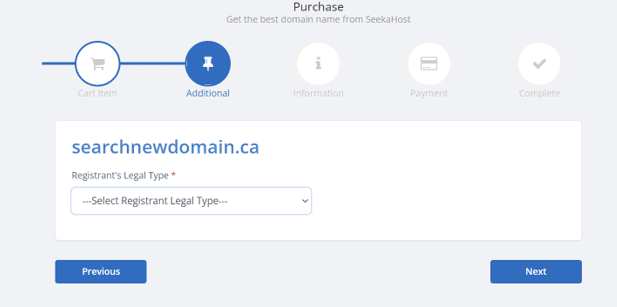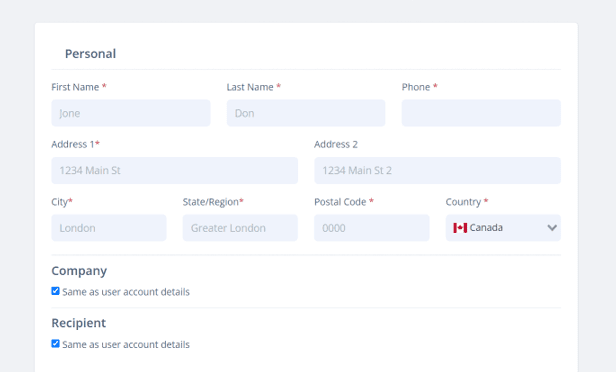
CA TLD Registration Requirements

By James Flarakos | November 23, 2022
CA is the country code TLD for Canada and is regulated by the Canadian Internet Registration Authority (CIRA).
- To register .ca from seekahost.app search the availability in the domain registration with extension.

- Add to cart and go to checkout

Key Points:
Auto renewal option available for .ca domains. If your domain needs to renew automatically check the auto renewal option (recommended).
- Select .CA TLDs Legal type in the additional.

Anyone who wants to register a .CA domain name must meet certain Canadian Presence Requirements (CPR). When registering .CA domain names, registrants must complete the Legal Type field on the additional tap form. From the drop-down list, choose the most appropriate Canadian Presence Requirement (CPR) category for the registrant.In order to satisfy the Canadian Presence requirement, the registrant must fall into one of the following categories:- Aboriginal Peoples (individuals or groups) indigenous to Canada—Any Inuit, First Nation, Metis or other people indigenous to Canada, any individual belonging to any Inuit, First Nation, Metis or other people indigenous to Canada and any collectivity of such Aboriginal peoples.
- Canadian Educational Institution—Any of the following: (i) a university or college which is located in Canada and which is authorized or recognized as a university or college under an Act of the legislature of a province or territory of Canada; (ii) a college, post-secondary school, vocational school, secondary school, pre-school or other school or educational institution which is located in Canada and which is recognized by the educational authorities of a province or territory of Canada or licensed under or maintained by an Act of Parliament of Canada or of the legislature of a province or territory of Canada.
- Canadian Hospital— A hospital which is located in Canada and which is licensed, authorized or approved to operate as a hospital under an Act of the legislature of a province or territory of Canada.
- Canadian Library, Archive or Museum— An institution, whether or not incorporated, that (i) is located in Canada and (ii) is not established or conducted for profit or does not form part of, or is not administered or directly or indirectly controlled by, a body that is established or conducted for profit, in which is held and maintained a collection of documents and other materials that is open to the public or to researchers.
- Canadian Political Party— A political party registered under a relevant electoral law of Canada or any province or territory of Canada.
- Canadian Trade Union—A trade union which is recognized by a labour board under the laws of Canada or any province or territory of Canada and which has its head office in Canada.
- Canadian Unincorporated Association—An unincorporated organization, association or club:
At least 80% of whose members: (A) are ordinarily resident in Canada (if such members are individuals); or (B) meet one of the conditions set out in paragraphs (a) to (f) above (if such members are not individuals); and
At least 80% of whose directors, officers, employees, managers, administrators or other representatives are ordinarily resident in Canada - Canadian citizen—A Canadian citizen of the age of majority under the laws of the province or territory in Canada in which he or she resides or last resided.
- Corporation (Canada or Canadian province or territory)—A corporation under the laws of Canada or any province or territory of Canada.
- Government or government entity in Canada—A province or a territory; an agent of Her Majesty the Queen in right of Canada, of a province or of a territory; a federal, provincial or territorial Crown corporation, government agency or government entity; and a regional, municipal or local area government.
- Her Majesty the Queen—Her Majesty the Queen in right of Canada
- Indian Band recognized by the Indian Act of Canada—Any Indian band as defined in the Indian Act, R.S.C. 1985, c. I-5, as amended from time to time, and any group of Indian bands.
- Legal Representative of a Canadian Citizen or Permanent Resident—An executor, administrator or other legal representative of a Canadian citizen or a permanent resident.
- Official mark registered in Canada—A Person which does not meet any of the foregoing conditions, but which is a Person intended to be protected by Subsection 9(1) of the Trade-Marks Act (Canada) at whose request the Registrar of Trade-marks has published notice of adoption of any badge, crest, emblem, official mark or other mark pursuant to Subsection 9(1), but in this case such permission is limited to an application to register a .ca domain name consisting of or including the exact word component of such badge, crest, emblem, official mark or other mark in respect of which such Person requested publications.
- Partnership Registered in Canada—A partnership, more than 66 2/3 % of whose partners meet one of the conditions set out in paragraphs (a) to (e) above, which is registered as a partnership under the laws of any province or territory of Canada.
- Permanent Resident of Canada—A permanent resident as defined in the Immigration Act (Canada) who is ordinarily resident in Canada (as defined below) and of the age of majority under the laws of the province or territory in Canada in which he or she resides or last resided.
- Trade-mark registered in Canada (by a non-Canadian owner)—A Person which does not meet any of the foregoing conditions, but which is the owner of a trade-mark which is the subject of a registration under the Trade-marks Act (Canada), but in this case such permission is limited to an application to register a .ca domain name consisting of or including the exact word component of that registered trade-mark
- Trust established in Canada—A trust established and subsisting under the laws of a province or territory of Canada, more than 66 2/3 % of whose trustees meet one of the conditions set out in paragraphs (a) to (d) above.
Important: From time to time, CIRA conducts a Registrant Information Audit to request proof of Canadian presence. The registrant would’ve received an email from CIRA asking them to upload relevant documents (Canadian passport, birth certificate, permanent resident card, etc) to the CIRA website. If the registrant ignores or cannot demonstrate Canadian presence, the domain will be deleted about two months from the start of the audit. CIRA would’ve sent out multiple notices to the registrant prior to the deletion of the domain.
- Update the contact information (personal/company/billing)
 Key Points:
Key Points:
- The registrant would’ve received an email from CIRA asking them to upload relevant documents to proof of Canadian presence.
- Personal information will be the domain registrant information. Therefore, make sure to give valid contact information.
- Make the payment.
After the payment success go to Domains side menu and check your domain status is “Active”. If the domain status shows “Processing” please contact the support team for more information.If domain status is “Waiting” please retry the domain registration with valid information (contact/additionals).Until domain status is “Active” domain not owned by the registration. Therefore, to avoid failed domain registration make sure to provide valid information (contact/additional/payment) during the checkout.


